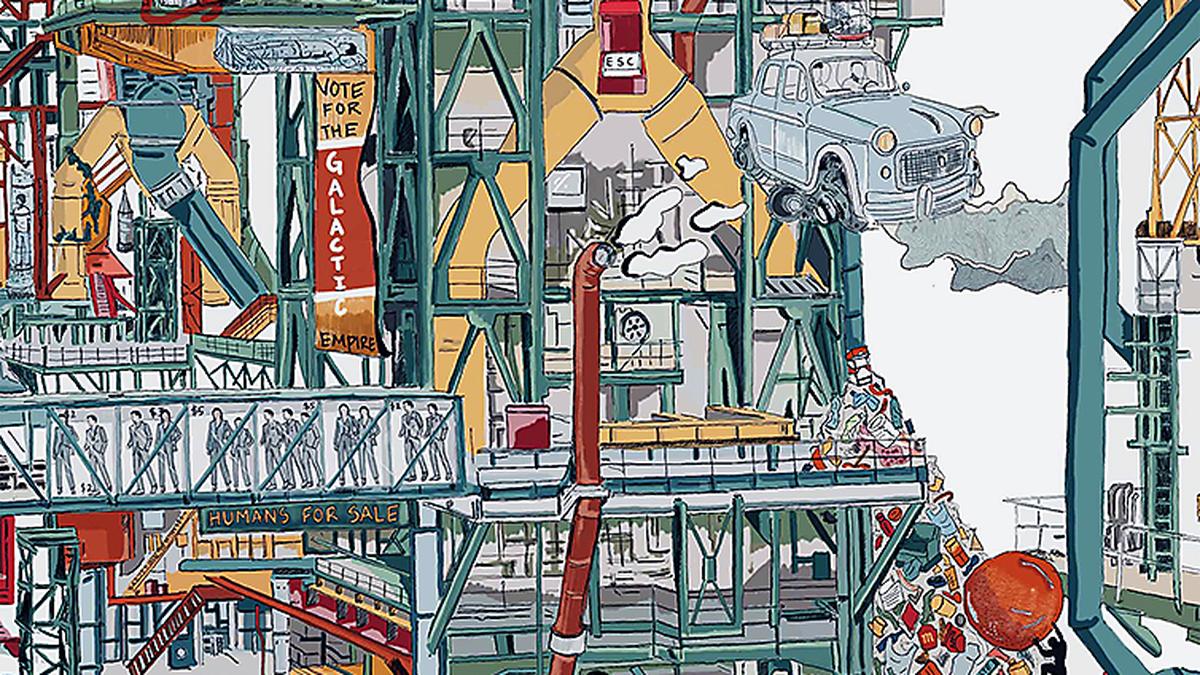
New York-based architect Malavika Madhuraj’s debut art show in India is on at Kochi
The Hindu
Architect Malavika Madhuraj's multidisciplinary exhibition in Kochi explores memory, spatial boundaries, and artistic transcendence through architectural illustration.
New York-based architect Malavika Madhuraj is gearing up for her first show in India, Liminal Lines, Eternal Spaces, an architectural exhibition, at Prussian Blue art gallery in Kochi. The show, she says, “is a multidisciplinary journey through architectural illustration, art and digital media that explores the interplay between memory, spatial boundaries and artistic transcendence.” The architect, who works with Studio Gang Architects, New York, graduated from the VIT School of Planning and Architecture, Vellore.
The Kochi native did her master’s at the Graduate School of Architecture, Planning and Preservation (GSAPP), Columbia University. Her work Litany of Dystopia was showcased at Roca London Gallery (2023) London; her installation Residues in Rust was exhibited at the Queens Museum (2021), New York; Flaneur, a project by her was part of the Chennai Architecture Foundation (2019). The show, which opens today, concludes on December 29. Architecture inspired her as she created these works, she says, “Architecture has always fascinated me for its ability to hold memories and stories within its forms. I’m inspired by how spaces, even after they are abandoned or forgotten, retain traces of the people who once inhabited them. The interplay of light and shadow on materials, the intricate details of liminal spaces and crevices, and the way people occupy and transform spaces — all of these elements influence my work. Architects like Paul Rudolph, Carlo Scarpa, and Cedric Price have profoundly shaped my perspective. My pieces often reimagine spaces that exist only in memory or dreams, blending inspiration from architectural decades and the emotions that these spaces evoke.”
Her works have a distinct Studio Ghibli feel; she says she has been inspired by Japanese animator Hayao Miyazaki’s story telling. “His every frame feels like a world brimming with life, memory, and emotion. His ability to blend the fantastical with the everyday resonates deeply with my approach to architecture and art. I also draw inspiration from Studio Ghibli’s colour palettes, which balance vibrancy with subtlety to evoke wonder and nostalgia. Like Miyazaki’s worlds, my works aim to capture the fleeting beauty of spaces—real or imagined—and the emotions they hold, inviting viewers to step into their own stories.” Although she has not formally studied art, she says, architecture equipped her with the foundational skills of storytelling, composition, and visual representation. “My artistic practice is deeply informed by these principles, allowing me to blur the lines between the technical and the expressive.”
Her paintings make one wonder if these are real or picked from her imagination. “Both. Some of the works are inspired by real locations, while others are entirely from my imagination. For instance, the depiction of the Centre Pompidou in Paris, designed by architects Renzo Piano and Richard Rogers, is based on an actual space. However, many of the spaces I create exist only in the realm of memory or dreams — imagined places that evoke the emotions and stories tied to spaces we have never seen but somehow feel connected to. I enjoy blending reality and fantasy to explore how architecture can hold both tangible and intangible narratives.” As her creative process evolved over the years, she moved from traditional media such as drawing and painting to a primarily tech-driven creative process. “It allows me to explore and experiment with precision and flexibility. I rely on software such as Autodesk Sketchbook and Procreate, which enable me to layer intricate details, play with light and texture, and build compositions that feel both realistic and surreal.” Liminal Lines, Eternal Spaces, on at Prussian Blue Art Hub (Kochi), concludes on December 29.













